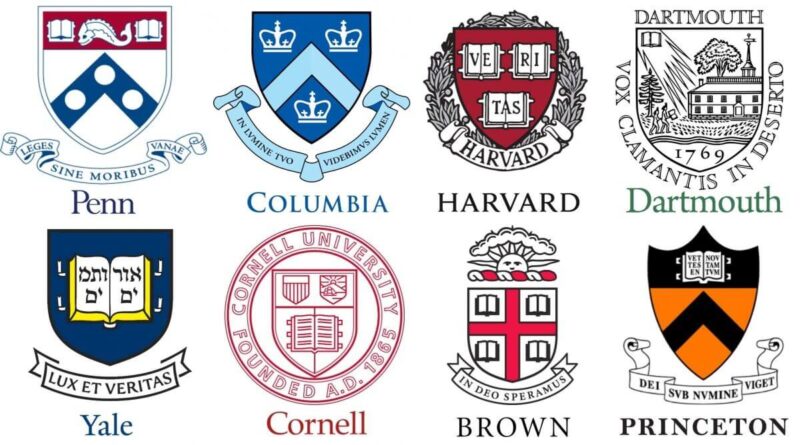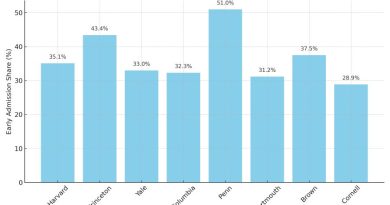Ivy League Universities Explained: Which is The best Fit for You
Ivy League universities are the best options for higher education. These are dream study destinations for students all over the world. Ivy League colleges prepare their students with a world-class education that opens various doors to unique opportunities. These universities include Harvard, Yale, Princeton, Columbia, the University of Pennsylvania, Dartmouth, Brown, and Cornell. All members of the Ivy League enjoy reputations for rigid academic programs, brilliant faculty, and exciting intellectual environments.
Excellence in the Ivy League is a legacy that goes back centuries, developing leadership in all realms, including government, law, business, and the sciences. Students not only experience top-class education but enjoy the life-changing experience of shaping character and building creativity, laying the bedrock for success in today’s global world.
Each of the Ivy League universities has its specific atmosphere; however, the spirit common to all strives for excellence in academic achievements and in developing personal skills. These universities encourage an environment to flourish intellectually and socially through small classes, a strong orientation towards research work, and large-scale networking within their alumni group.
The Ivy League schools attract a certain caliber of students who aren’t looking just for a degree but are seeking a life-changing experience that will eventually equip them with all the tools necessary to make meaningful contributions to society. Whether it’s studying at the heart of New York City or amidst the picturesque landscapes of New England, Ivy League universities provide an ideal setting to cultivate lifelong skills and build a professional network that lasts a lifetime.
Ivy League Universities: A Benchmark of Excellence
The Ivy League has long been associated with academic prestige, and its schools consistently rank among the best globally and nationally. Below is an in-depth exploration of the Ivy League institutions, ranked by the US News and World Report’s National University Rankings (NUR).
1. Princeton University
Ranked #1 in the National University Rankings, Princeton University is the oldest Ivy League university. It was established in 1746. It is recognized for its rigorous academic programs. The undergraduate programs at Princeton are its best offerings. Princeton excels in fields such as engineering, public policy, and the humanities.
Princeton’s commitment to undergraduate education is evident through its extensive offerings in the humanities, social sciences, natural sciences, and engineering. The university programs are designed to encourage independent study, requiring all seniors to complete a senior thesis. Set against a picturesque campus, Princeton fosters a vibrant community and provides an intellectually stimulating environment for students to thrive.
- Acceptance Rate: Princeton’s highly competitive acceptance rate underscores its status as a leading institution.
- SAT Scores: The middle 50% range for SAT scores typically falls between 1460 and 1570.
- ACT Scores: The middle 50% range for ACT scores generally lies between 33 and 35.
Learn more about studying at Princeton University here.
2. Harvard University
Harvard is Ranked number 3 in international ranking. Harvard University stands as a global leader in education and research. With over 100 research centers, it hosts some of the best research schools in the world including the Harvard Business School, the John F. Kennedy School of Government, and the Harvard Law School.
Harvard is the oldest higher education institution in the United States. It is located in Cambridge, Massachusetts. It offers a wide range of undergraduate and graduate programs, supported by a world-class faculty and all-embracing library resources. Harvard’s diverse student body and unparalleled academic infrastructure make it an exceptional place for intellectual and personal growth.
- Acceptance Rate: For the undergraduate class of 2025, Harvard admitted 1,968 students out of 57,435 applicants, reflecting an acceptance rate of 3.4%.
- SAT Scores: The middle 50% range for SAT scores is 710–770 for Evidence-Based Reading and Writing, and 750–800 for Math.
- ACT Scores: The middle 50% range for ACT composite scores is 33–35.
Check out Harvard’s admissions criteria and application tips here.
3. Yale University
Ranked #5, Yale is known for its law school, excellent arts programs, and professional schools in management, medicine, and nursing. It offers a rich cultural and academic atmosphere in New Haven, Connecticut.
Yale’s renowned residential college system fosters a strong sense of community while providing abundant opportunities for undergraduate research and extracurricular involvement. Its offerings span disciplines ranging from the sciences to the arts, making it a versatile institution for students of varying interests.
- Acceptance Rate: In 2022, Yale admitted 2,234 students to the Class of 2026 out of 50,015 applicants, resulting in an acceptance rate of 4.46%.
- SAT Scores: The middle 50% range for SAT scores typically lies between 1460 and 1560.
- ACT Scores: The middle 50% range for ACT scores is generally between 33 and 35.
Explore scholarships to study at Yale here.
4. University of Pennsylvania (UPenn)
UPenn is recognized for its expansive study-abroad programs, spanning over 50 countries. It is also home to the prestigious Wharton School of Business.
Situated in Philadelphia, UPenn merges liberal arts and professional studies in an interdisciplinary framework. With a strong emphasis on research and civic engagement, the university provides a dynamic urban campus experience.
- Acceptance Rate: For the class of 2026, UPenn received 54,588 applications and admitted 3,404 students, resulting in an acceptance rate of 4.24%.
- SAT Scores: The middle 50% range for SAT scores is 1510–1560.
- ACT Scores: The middle 50% range for ACT scores is 34–36.
Discover why UPenn is a top choice for international students here.
5. Cornell University
Cornell is the youngest Ivy League school. Cornell was established in 1865. It offers diverse programs spanning agriculture, architecture, engineering, and more.
Cornell’s blend of Ivy League tradition with a commitment to public service makes it unique. Its picturesque campus and inclusive community attract students from all over the world, offering a wide spectrum of academic opportunities.
- Acceptance Rate: Cornell’s acceptance rate varies by college but averages around 10%.
- SAT Scores: The middle 50% range for SAT scores is approximately 1400–1560.
- ACT Scores: The middle 50% range for ACT scores is about 32–35.
Learn about Cornell’s admissions here.
6. Brown University
Ranked #13, Brown University in Providence, Rhode Island, is known for its Open Curriculum, which allows students to design their academic paths without general education requirements.
This flexibility fosters intellectual curiosity and independence, enabling students to explore their passions freely. Brown’s emphasis on student-driven education is a hallmark of its academic philosophy.
- Acceptance Rate: Brown received 50,649 applications for the undergraduate class of 2026 and admitted 2,560 students, resulting in an acceptance rate of 5.0%.
- SAT Scores: The middle 50% range for SAT scores is typically between 1440 and 1570.
- ACT Scores: The middle 50% range for ACT scores is generally between 33 and 35.
Explore Brown’s unique offerings here.
7. Columbia University
Columbia University is located in the heart of New York City. Known for its innovation, it offers strong programs in business, journalism, and engineering.
Columbia’s Core Curriculum ensures that all students receive a well-rounded education in the humanities, sciences, and social sciences. Its location in NYC provides students with unmatched opportunities to engage with global experts and industries.
- Acceptance Rate: Columbia’s undergraduate acceptance rate is approximately 3.9%, making it one of the most selective universities worldwide.
- SAT Scores: The middle 50% range for SAT scores is 1510–1560.
- ACT Scores: The middle 50% range for ACT scores is 34–35.
Find out about living and studying in NYC here.
8. Dartmouth College
Ranked #15, Dartmouth College offers a personalized education experience, thanks to its low student-to-faculty ratio.
Located in Hanover, New Hampshire, Dartmouth combines the resources of a large research university with the close-knit environment of a liberal arts college. Its focus on experiential learning and unique programs like the Dartmouth Outing Club set it apart.
- Acceptance Rate: Dartmouth’s acceptance rate for the Class of 2026 was 6.2%, admitting just over 1,700 students.
- SAT Scores: The middle 50% range for SAT scores is 1440–1560.
- ACT Scores: The middle 50% range for ACT scores is 32–35.
Explore why Dartmouth stands out here.
Final Thoughts
Choosing the right university is a life-changing decision that will shape your academic and professional journey. By leveraging global rankings, understanding each institution’s unique offerings, and exploring scholarship opportunities, you can embark on a fulfilling and enriching academic experience.
Visit uscanadacolleges.com for more tips, guides, and resources on studying abroad.




